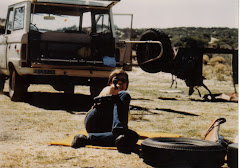
Early last week, I got into a little fender-bender on the way home from work. Not much damage, but a little. You should see the other car. That silly plastic bumper broke clean off into several pieces. So, I'm taking the car to the body shop tomorrow to have the deep scratch fixed up and repainted.
I went to the shop Friday to set myself up with an appointment, and scope out the joint. Not having had a traffic dust-up since the mid-1960's, I don't know any body men. My insurance company recommended a shop in North Hollywood, so that's where I went.
Turns out I like the owner. He talks straight and is in his late fifties, so he's been around the block a couple of times. He has an East European accent, and fairly reeks of old world craftsmanship.
This leads me to ask myself why I find these things so comforting.
I've spent a lot of time fooling around with cars and motorcycles, including some years working in and managing gas stations. Years ago, I knew a young line mechanic who claimed he didn't care if he got the job done correctly, as long as he could get it done fast. If he could beat the Flat Rate Book's time, he'd get paid as a percentage of the flat rate, rather than his hourly salary.
Follow me on this, for those of you who aren't familiar. The mechanic's Flat Rate book shows how many hours it should take to do a particular repair. Let's say a brake job, four wheels, no complications, should take 2 hours, according to the book. Let's say my mechanic friend blows through the job in one hour. Instead of getting $30 for two hours' work, he gets the same $30 for an hour's work. He can go on and do another brake job in the next hour and get another $30. Not all auto shops work this way, but some do.
My friend, in order to work this quickly, had to blow through the job, eschewing several checks and cautions in his work. Anything to get the car out of his bay fast, and without any immediately noticeable problems. If something goes wrong day after tomorrow, bring it back; he'll fix it for free.
Often, the work goes well, with no problems. Occasionally, a customer has a problem and returns the car. My friend would then fix it more carefully, at no additional charge. Rarely, the customer has an accident caused by an incomplete repair, but responsibility doesn't come back to the mechanic. Often, to avoid the hassle of losing his car for another day, the customer just drives it as it is, problem and all. The Mechanic wins in almost every case.
Knowing this, I try to do as much of my mechanical work as I can, myself. Otherwise, I look for the old bear, the mechanic who's been at it for thirty, forty years and who takes pride in his ability and knowledge. He'd rather do the job right, than fast. When I find someone like that, he gets all my patronage.
The older guys seem to have grown up in a time when the work ethic was better--not all of them, to be sure, but many. The youngsters now in their twenties and thirties grew up in an atmosphere of quick self satisfaction and spur-of-the-moment pragmatism.
This body shop guy reads like a man who takes pride in a good job. I also met his son, who is a shop manager, and he actually seems the same way. Enthusiastic. Proud of his work.
I hope those work attitudes don't die out.
One's life is best summed up in the quality of his work.
Warm regards,
Col. Hogan
Stalag California












